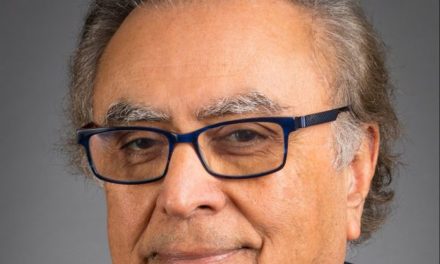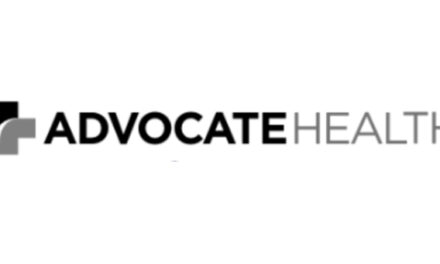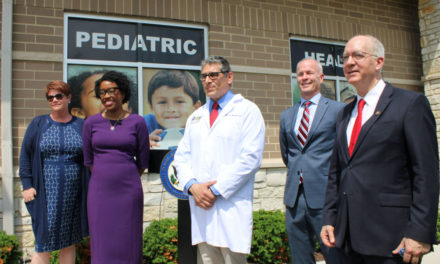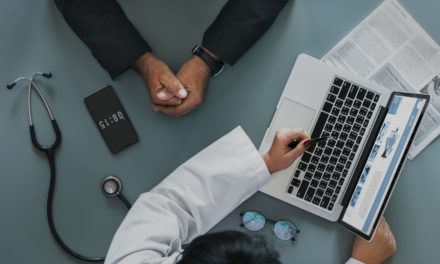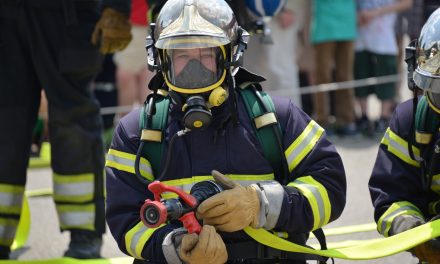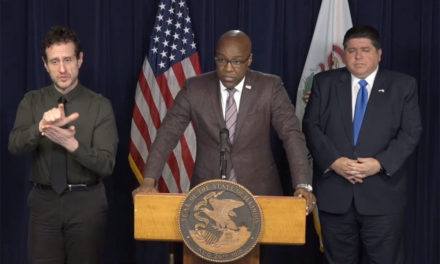
On the record with Dr. Jay Chauhan, president of the Chicago Medical Society
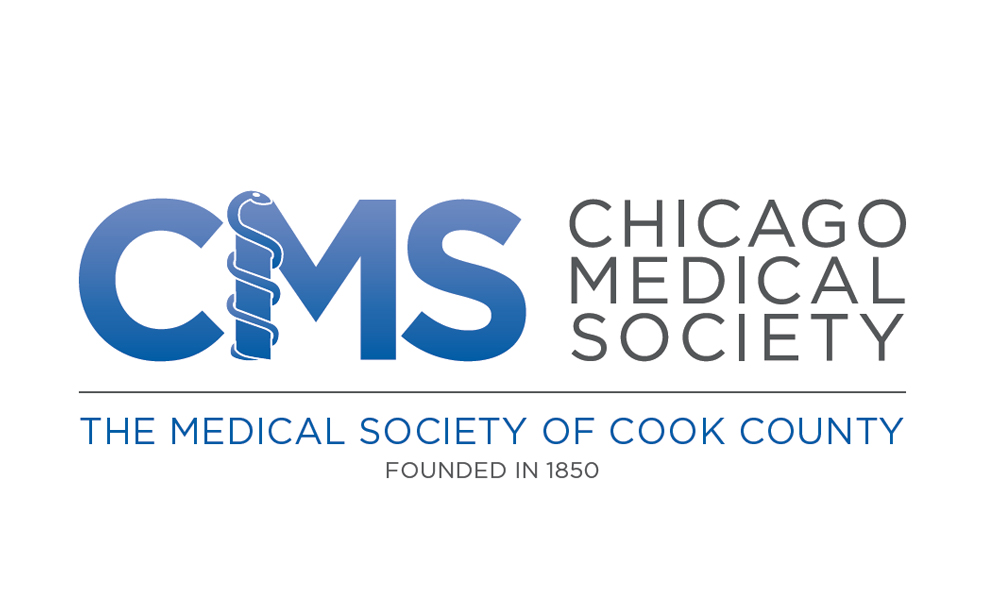
With the expected peak of the new coronavirus pandemic still weeks away in Illinois, the stress is palpable among healthcare workers, said Dr. Jay Chauhan, president of the Chicago Medical Society, an association that represents more than 17,000 doctors in the city.
As they prepare for an expected surge, Chauhan said questions remain about the supply of personal protective equipment and other measures to protect physicians and nurses.
Chauhan spoke to Health News Illinois Wednesday afternoon about how physicians are handling the pandemic in Chicago, the emotional toll of the crisis and a call for the state to shield frontline health professionals from civil liability.
Read more below.
HNI: What is the current picture right now for healthcare workers in Chicago?
JC: What I’m hearing from our members is that they’re quite concerned. We just completed a survey and just shy of 1,000 physicians responded. Of the 1,000 physicians, 93 percent are concerned about becoming infected at some point and 85 percent of emergency room physicians have had contact with a COVID-19 positive patient already. And there are concerns about the supply chain. We’re looking at our predecessors like Italy, Spain, and New York City, and new hot spots of Detroit and New Orleans, and we’re quite concerned…
The more and more data that comes out, we are finding that people are typically asymptomatic when they are contagious to other individuals for at least two to three days before their symptoms begin. Once their symptoms resolve, they remain contagious for about another eight days. And that’s why we’re getting a bit concerned because in Spain, if you take a look at all their COIVD-19 positive patients, 14 percent of them are healthcare workers. And the perception is that there’s enough equipment, but a lot of that depends on which institution that you’re at. So if you are at a very large institution, and you’re part of a large group of hospitals, they tend to have better supplies of equipment versus the solo standing hospitals. And so we have members telling us that they’re working the emergency room, they get one N95 mask and they’re asked to reuse it the following shift. So this goes completely in the face of the universal precautions that we’ve been taught for decades, from medical school on, that once you use a mask and examine someone, you should discard it and get a new mask. So unfortunately what has happened is, because there’s a supply chain issue here, it moves the goal post to match the supply chain versus what is usual and customary for us to do to not only protect the healthcare workers but so that healthcare workers can continue working without getting ill to assist the new set of patients that are ultimately going to come through because we’re nowhere near the peak right now.
HNI: What stood out most to you from your survey?
JC: What stood out to me is the number of ER physicians who have already been exposed to a COVID-19 positive patient. I found that very remarkable. I found it remarkable the amount of fear and concern that they had, and that they felt that they could be better partners with other stakeholders in terms of getting information, like how many ventilators are going to be coming, how many masks are available, how many days worth of equipment do we have. That information does not appear to be being communicated to the frontline individuals so that they have some solace that, when they come back to work, they’re going to have the equipment and tools to take care of people. As I have argued with medicine, everyone thinks it is very intellectual, which it is, but it’s more emotional because you’re having to deal with human beings, illness and disease and have to watch people suffer and sometimes pass away. But when you don’t have the tools to help people, it leaves you in a position, an inability to act with the information and knowledge that you have, and makes it more difficult to accept the outcome.
HNI: What is the concern level right now with the availability of protective equipment?
JC: It depends on the health systems, unfortunately. I can’t make a global statement. We’ve looked for resources where we can find out, but I think it goes institution to institution. But I think you can judge by the way Gov. JB Pritzker has been asking, in terms of getting adequate masks and equipment, that my impression is that he’s being told that there’s not going to be enough for any extended period of time.
I think what we need to do is we can’t just look at the way things are now. We have to project ahead a week or two, right? So if we need equipment and we order it today, we can’t expect it tomorrow. We can expect it a week or two from now. And so I’m looking at what’s happening in New York and expecting that to be replicated across the country. The word that we’re trying to get out is, ‘Hey, let’s try to get ahead of the curve so we don’t duplicate what’s going on in New York.’ There the healthcare workers are becoming infected, and now they can’t come back to work. What we’re trying to do is to look forward, not what’s happening immediately now, or what’s potentially going to happen in about two weeks.
HNI: You mentioned recently that Chicago is at capacity in regard to ICU bed availability. Can you elaborate on that?
JC: When our members came to us and informed us that ICU beds were full, they were referring to the normal, usual and customary ICU units at the hospital. So if you step back a moment and you look at normal ICU staffing, most hospitals hire a number of respiratory therapists, intensive care nurses and physicians to man their normal ICU beds. What is happening right now at the hospitals, they are having a tough time moving nurses into the ICU setting. And what they’re doing is they’re taking recovery room nurses, and they’re pairing them up with ICU nurses. They’re fairly comparable in their training, but not exactly the same. And they’re taking cardiologists and they’re pairing them up with intensivists, who have additional training for ICU beds. So you only have a very limited resource of people for managing ICU patients, because the rigor, the intensity of care is far greater than a typical patient, like a postoperative surgical patient, depending on the complexity. So what we were trying to get across was the normal ICU beds were full. And now what the hospitals were going to do is use their extra space to create more ICU beds and to use operating room suites where we have ventilators to convert them over into ICU beds as well…
So what we’re trying to emphasize is… the purpose of this is not to demean anyone, it’s not to imply that people are unprepared. But it’s to let everyone know there’s going to have to be some recourse, some rationing that’s going to be involved.
HNI: The society has requested that Gov. Pritzker shield frontline health professionals from civil liability. Can you tell me more about why you believe that’s important?
JC: So we feel strongly that in these unprecedented times, there needs to be some relief. The physicians are going to have enough PTSD from watching patients that are passing away in front of their eyes, from not having adequate equipment, from lack of sleep, very strenuous conditions, because you’re going to be running nonstop. The additional concerns about liability are just going to add to that. And in order to get physicians to really engage, some form of liability relief or immunity really should be put in place as part of an emergency act. And this is not unprecedented. Gov. Andrew Cuomo did this in New York, and we have physicians in the Chicago area that are willing to go to New York and work and help them because they know they’ll be protected rather than stay in Chicago and Illinois, because they know they run the risk of liability issues.
(Editor’s note: After this interview, Pritzker signed an executive order granting healthcare facilities, professionals, and volunteers immunity from civil liability for any injury or death alleged, unless caused by gross negligence or willful misconduct.)
HNI: What else can be done to protect and support healthcare workers during this crisis?
JC: I think number one is to kind of reiterate what we’ve been doing all the time with the general public, and that is to really keep the warnings as best as they can and understand that this affects everybody. There’s no particular socioeconomic class, there’s no particular race. Everyone is afflicted by this. Now you can look statistically if you don’t have access to healthcare, if you’re overweight, if you get diabetes and hypertension, if you’re a man, if you’re a smoker, those people have a greater amount of difficulty. However, it doesn’t preclude anybody else from getting it. So we’ve seen very healthy 30-year-olds pass away from this disease. We’ve seen teenagers pass away from this disease. We need the citizenry to be aware that they have a big role to play. Every little bit is going to add up to reducing the tsunami of patients that will be coming in at one time and overwhelming the system. The system can work, but it cannot exceed its rate-limiting staff, which is the number of ICU beds, the number of beds, the amount of medication, the amount of personnel that is there.
Number two is, as a healthcare provider, a nurse, the maintenance folks, dietitian, the doctors, the ancillary staff, they need to know that when they go to work, they have enough protective equipment so that they’re not putting themselves at risk so that they can come back and continue to do the good work that they’re doing. And also to not take it home to their family, to not take it home to the community. Under all of those scenarios, there would be a great deal of guilt involved with any of those.
The third part of all of this is that we need the equipment to take care of our patients. It’s incredibly frustrating to find that you’ve got somebody, you may not have the medication to put the breathing tube in or you might not have the ventilator to put them on. You might have to manually bag the patient until another ventilator comes available. And then how does this decision-making take place? We need a quick, ethical discussion done with transparency, so that we understand which individuals are going to be getting a ventilator and which individuals are going to not get a ventilator. Why? Because we don’t want society to point the finger at the cashier that there’s a problem with the store when the cashier is not responsible for stocking the shelves, making the orders or doing anything. And that’s what the physicians and nurses feel like.
Health News Illinois is removing the password on all stories related to the coronavirus. For the latest developments follow us on Twitter at @healthnewsil or check out our website. For complete healthcare coverage, sign up for a free trial to our daily email newsletter.

